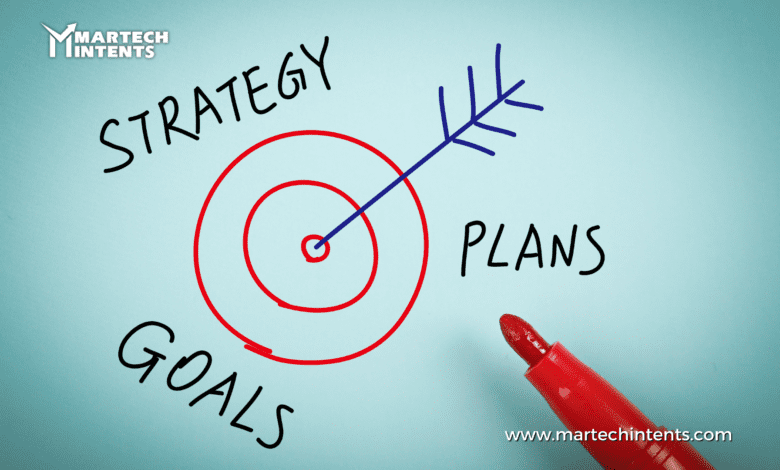Maximizing Business Growth: A Data-Driven MarTech Strategy for Business Goals

Introduction:
Data-Driven MarTech Strategy: In today’s rapidly evolving digital landscape, a well-crafted Marketing Technology (MarTech) strategy has become paramount for businesses looking to stay ahead and achieve substantial growth.
A carefully planned and data-driven MarTech strategy tailored to your specific business goals can be the catalyst to unlock your marketing potential and elevate your brand’s success.
Data-Driven MarTech Strategy:
I. Understanding Your Business Goals and Objectives:
At the very core of your MarTech endeavors lies a clear understanding of your business goals and objectives.
Before diving into the realm of MarTech tools and solutions, it is imperative to conduct a thorough analysis of your marketing aspirations and what you aim to achieve.
Define Specific, Measurable, Achievable, Relevant, and Time-bound (SMART) goals that align seamlessly with your overall business vision.
Your MarTech strategy should encompass all key facets of your marketing journey, from lead generation and customer acquisition to nurturing and retention.
By setting well-defined and tangible goals, your MarTech strategy gains direction, purpose, and a roadmap for success.
II. Evaluating Your MarTech Needs for Aligned Outcomes:
Navigating through the vast and ever-growing array of MarTech solutions can be overwhelming.
To make the most out of your MarTech investments, a detailed evaluation of your marketing processes and requirements is essential.
Identify pain points and areas that would significantly benefit from automation or optimization.
Opt for MarTech tools that align with your specific needs and objectives. Whether it’s advanced analytics, content management systems, or marketing automation platforms, choose solutions that are tailor-made to amplify your marketing efforts and drive results.
III. Conducting a Comprehensive MarTech Audit:
Before integrating new MarTech tools into your existing marketing stack, it is crucial to conduct a comprehensive MarTech audit.
This evaluation allows you to streamline your marketing technologies, ensuring seamless integration, minimizing data silos and enhancing overall data flow.
A well-audited MarTech stack fosters enhanced data-driven decision-making and empowers your team to access and analyze crucial insights effortlessly.
By optimizing your tech stack, you ensure that your MarTech strategy is primed for success and ready to adapt to changing marketing dynamics.
IV. Building a Data-Driven Approach for Personalization:
Data lies at the heart of any effective MarTech strategy. To create personalized and targeted marketing campaigns, ensure your data is accurate, reliable, and adheres to data privacy regulations like GDPR.
Leverage data analytics to gain actionable insights into customer behavior, preferences, and journey.
Embrace artificial intelligence and machine learning to predict customer behavior, optimize content delivery, and offer highly personalized experiences.
A data-driven MarTech strategy enables you to build lasting connections with your audience and elevate customer satisfaction.
V. Collaborating with Stakeholders for Seamless Implementation:
To ensure the seamless implementation and success of your MarTech strategy, fostering collaboration across departments is essential.
Engage key stakeholders, including marketing, sales, IT, and customer service teams, to ensure that your MarTech efforts align harmoniously with the overall business goals.
Promote open communication and encourage feedback, facilitating a culture of innovation and continuous improvement.
Collaborative efforts enhance the effectiveness of your MarTech strategy, fostering a unified and customer-centric approach.
VI. Testing and Piloting for Refinement:
Piloting and testing your MarTech strategy before full-scale implementation is a prudent approach.
Use A/B testing to compare the performance of different MarTech tools and strategies, and gain valuable insights into what works best for your brand.
By piloting, you can identify areas for refinement and optimization, ensuring that your MarTech strategy operates at peak efficiency and delivers the desired results.
A well-tested MarTech strategy is well-positioned to succeed in a competitive digital landscape.
VII. Training and Upskilling for MarTech Mastery:
Implementing new MarTech tools may require your team to learn and adapt to new processes.
Investing in comprehensive training and upskilling programs empowers your team to harness the full potential of the technology at their disposal.
Encourage a learning culture within your organization and support your team in obtaining certifications to stay updated with the latest MarTech trends and best practices.
A skilled and knowledgeable team is essential for successful MarTech implementation and innovation.
Learn more about Winning MarTech Strategy A 5-Step Guide
Conclusion: Embrace the Power of a Data-Driven MarTech Strategy for Business Goals
Developing and implementing a data-driven MarTech strategy that aligns with your business goals is ongoing.
Regularly monitor the performance of your MarTech stack, gather feedback, and make necessary adjustments to optimize results continually.
By embracing a data-driven approach, fostering collaboration among teams, and investing in the continuous development of your team’s skills, your MarTech strategy will serve as a powerful tool for unlocking your brand’s potential.
Empowered with insights, personalization, and streamlined processes, your business will thrive in the dynamic digital landscape, driving growth, and achieving the envisioned success. A well-executed MarTech strategy is the key to a thriving and future-proof business.




